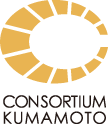ABOUT
About the Consortium of Universities in Kumamoto
Explanation about the organization
The Higher Education Consortium of Kumamoto was established on January 20, 2006 with thirteen educational institutions (universities & colleges, junior colleges, and national colleges of technology) in the prefecture.
The Kumamoto Prefectural College of Technology, and the Kumamoto Study Center of the University of the Air later joined the consortium.
On April 1, 2013, Kumamoto Prefecture and Kumamoto City joined as regular members and the 16-member organization became incorporated. At that time the name was changed to the General Incorporated Association of the Consortium of Universities of Kumamoto.
The purpose of this organization is to contribute to the improvement and development of education and culture in the local community, as well as the improvement of Kumamoto’s educational environment through cooperation among higher education institutions towards enhancing education and research and collaboration with local government and industry.
*The Kumamoto Study Center of the University of the Air left the organization on March 31, 2021.
Student Education Division
Admission Guidance Seminar Projects
So as to encourage interest in higher education among high school students, universities, colleges, and junior colleges in the prefecture offer simulated classes and counseling booths.
Student Exchange Promotion Projects
The Student Planning Committee organizes projects and events arranged by the students themselves. It also holds study sessions on such topics as “Embracing Cultural Differences” and “SDGs and Us”.
Joint Internship project
Students at universities and other institutes of higher education take part in work experiences at companies within Kumamoto Prefecture. These experiences raise awareness of employment opportunities and deepen understanding of the local economy and corporate activities. Presentations of the results of the students’ experiences are offered afterwards.
Faculty Development / Staff Development Projects
Staff Development (SD) projects have been in place since fiscal 2014 with the aim of improving faculty and staff. In addition to the training programs and follow-up programs for managers and mid-career staff members, exchange meetings for different types of work are held. Faculty / Staff Development training programs were inaugurated in fiscal 2021.
International Exchange Division
International Students Support Projects
In order to strengthen the acceptance system for foreign students and increase their numbers in the prefecture, a variety of support projects exist. Examples include One-Stop Consultation Services, International Student Social Media Networks, Job Interview Preparation Courses, and programs held jointly with other organizations.
College Town Kumamoto Tour for International Students
International students studying at Japanese language schools in hopes of entering colleges and universities in Kyushu are invited to Kumamoto for information sessions, presentations on study abroad experiences, tours of Kumamoto Castle and other sightseeing spots, and more. This lets potential students learn about the opportunities and attractions of Kumamoto and helps increase the number of international students in the prefecture.
Multilingual Information Dissemination
(pamphlets and website)
To introduce the study abroad experiences of both faculty members and enrolled students of participating institutions, pamphlets in Japanese, English, and Chinese are distributed to Japanese language schools, primarily in Kyushu. A website is available in multiple languages and information is shared through social media. We also visit Japanese language schools (mainly in Fukuoka and Kumamoto Prefectures) to exchange information.
Kumamoto City Housing Moving / Moving out Supports Project for International Students
In securing housing for international students, we have been granted use of 6 units of municipal housing. We have also been requested by Kumamoto City to manage the procedures of moving in and out for international students who very often have difficulties applying for housing under the usual tenant qualification standards.
Community Creation Division
Environmental Improvement Activities
To promote interaction among students in the area, knowledge about Kumamoto, and contributions to the community, we conduct environmental improvement activities and projects addressing local issues.
Collaborative Projects for the Promotion of Gender Equality
In fiscal 2008, the Gender Equality Promotion and Cooperation Committee was established to plan and conduct lectures, seminars, and study sessions on a variety of themes such as work-life balance, nursing care, and LGBTs topics.
Collaborative projects to support students with disabilities
In order to provide support for students with disabilities enrolled in member institutions, study sessions, lectures, information exchanges, and discussions are held at the institutions. Examples of session topics include “Understanding Students with Adjustment Disorders,” “Understanding and Supporting Students with Speech Difficulties,” and “Support for Universities regarding Career Placement for Students with Disabilities.”

